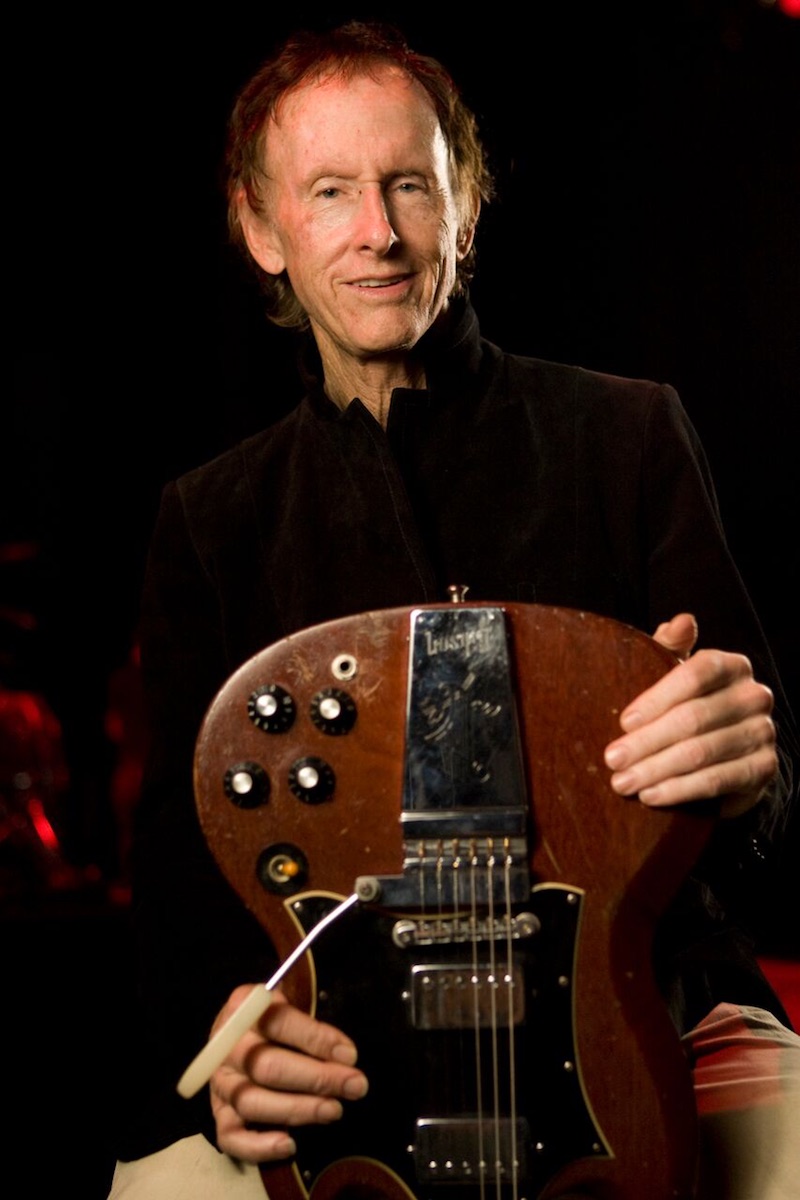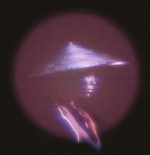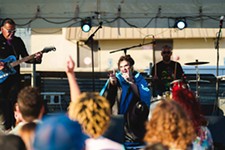Doors Guitarist Robby Krieger Rallies
ROT thunderdome enlists some “Roadhouse Blues”
By Raoul Hernandez, 1:00PM, Thu. Jun. 9, 2016
L.A. native Robby Krieger talks like a surfer. The Doors guitarist, 70, who co-headlines the weekend’s Republic of Texas Biker Rally on Saturday with Steppenwolf’s John Kay, leaves a lot of sea and sky between some utterances, but his laid-back drawl belies the undertow of almost a half century of rock & roll history. Break on through.
Austin Chronicle: You’ve played in Austin before, correct?
Robby Krieger: Yeah, yeah. Quite a few times.
AC: But the Doors never did.
RK: No, no. We played Dallas and the bigger cities at the time. Austin wasn’t really a music town back then, I guess.
AC: When you did get here, what sort of impression did it make on you?
RK: First time we came through was with my own band, the Robby Krieger Band, and I remember there being a lot of cool clubs. I can’t remember which one we played, but it was pretty happening. I think the last time I was there, I sat in with the Stone Temple Pilots [at the Austin Music Hall during SXSW 2010].
AC: How did that come about?
RK: They had played on a Doors tribute album [2000’s Stoned Immaculate: The Music of the Doors], so we had gotten to know them. I forget why I was there, exactly, but I ran into one of them and they said, “Hey, come and sit in.” We did “Roadhouse Blues.”
AC: Were you surprised by Scott Weiland’s death?
RK: Yeah, sort of. I knew he’d had his problems with drugs and all that, but actually my manager, Tom Vitorino, who’s been managing my live shows for the past 20 years or more, he was managing Scott at the time. He was really surprised, because he thought Scott was getting it together, and they were on tour. So yeah, it was a shock.
AC: You’ve had been in the music business almost your entire life now and had people close to you die from drugs. Then someone like Prince, who everyone thought led a pretty drug-free lifestyle, dies of the same. Is this the most dangerous industry a creative can get into?
RK: [Laughs] Maybe, except for being a soldier. It’s tough, because life on the road is not easy, and a lot of times you turn to drugs to help you through that. Such a weird lifestyle.
AC: Were you able to avoid those pitfalls in your own personal life?
RK: Well, back in the Doors days, I was able to. Just from seeing Jim [Morrison] overdoing it and everything made me go the other way and try to be the opposite. But then after the Doors, I did have my own drug problems. Seemed like everybody was, especially in L.A. back in the Seventies and Eighties.
AC: I imagine that’s even harder for an individual whose initial band was broken up by an overdose death. That’s got to haunt you on top of just the actual drug problem.
RK: Yeah, exactly. You think you would learn from the experience [laughs], but it didn’t work out that way.
AC: When you play Austin this time, you’re co-headlining the Republic of Texas Biker Rally. Are you a motorcyclist?
RK: Um, I used to have one. Or at least my brother did. I used to use it all the time. But after seeing some of my friends falling off and messing up their wrists and hands, I said, “Forget it, I’m not doing this anymore.” One of my friends died on a motorcycle, and yeah, I kinda gave up on it.
AC: You had a band with Berry Oakley Jr., at one point, no? Obviously his father [the Allman Brothers’ original bassist] died in a motorcycle wreck.
RK: Yeah, he and my son Waylon, who’s singing with my band now, had a band called Bloodline. Joe Bonamassa was in it, and Miles Davis’ kid was the drummer. They were all buddies, so I had Waylon and Berry in my band for quite a few years. We were pretty close. Berry’s mother was married to [Doors drummer] John Densmore before Berry was born.
AC: There’s a six degrees of rock & roll separation for you.
RK: [Laughs] You never knew that? Yeah, yeah: John and Julia were married, then when they broke up, Julia became friendly with the Allman Brothers, and she was very close to Berry Oakley, and they had a son, little Berry Jr.
AC: You read about musicians from all over the world coming to Texas the first time and their having a lot of mythology to fall back on. What was it like for you the first time, back in the Sixties?
RK: [Chuckles] It had a certain mystique, you know. A guy I knew in high school was from Lubbock, and he always used to tell me about it. Sounded pretty cool. But when I first came to Texas, it wasn’t that different than most big cities. I mean, I didn’t really get to go hang out in the wild part of Texas, but Austin has become the cool music town over the last 20, 30 years, so that’s how I think of it now.
AC: I recall you and Ray Manzarek coming to the Backyard with an iteration of the Doors fronted by Ian Astbury of the Cult. The Cult are opening the ROT Rally on Thursday. For you, what made Ian that stand-in voice for Jim Morrison?
RK: Ian was always a Doors fan. Obviously you could tell from the band’s first couple of albums, but he was friends with Danny Sugarman, who wrote [initial Doors biography] No One Here Gets Out Alive. For a long time, Danny would tell me about Ian – this is after Jim died: “Oh, you have to get together with Ian. He’d be perfect for you guys.”
We never really took it seriously until we did a show; Ray, John, and I did the VH1 Storytellers, so we had Ian come along with Scott Weiland and a bunch of other guys and sing a Doors song. He was one of the better guys, I thought. That’s when we first met him and how it came about.
AC: Y’all resisted doing that for a long time. I’m also thinking of the two Doors albums that came out after Jim died. The remaining trio handled the singing.
RK: Right. Those were just recently re-released, finally: Other Voices and Full Circle. But yeah, exactly, we told ourselves, “Oh man, what are we going to do? We can’t replace Jim Morrison. That would be stupid.” So Ray and I sang the songs ourselves. Years later we finally got talked into doing this VH1 show, and having different people come in and sing. We thought, “Well, that’s cool. At least it wouldn’t be one guy trying to come in and replace Jim Morrison.”
We had a bunch of guys each doing one song. After that, they did the Doors tribute album, which was pretty cool. We had a lot of different singers on that as well, so it came together little by little. We hadn’t performed as the Doors since those days, and in the year 2000, Ray and I decided it was time to try it again, so Ian was the first guy we thought of.
AC: Now that Ray has also passed on, do you feel any pressure to do something with John Densmore?
RK: We wanted John to be part of that thing back in 2000, but he didn’t want to do it. He’s always resisted doing it. What his reasons are I’m not sure. Ray and John were always at odds after they both came out with their books and kinda put each other down in them and a lot of stupid stuff like that. But John and I have done a few things since Ray passed on, and I hope we’ll do some more.
We did a tribute to Ray a couple of months ago in L.A. We had a great bunch of guys, and we’re making a video out of it. It was at the Henry Fonda Theatre in L.A., and we had the bass player from Stone Temple Pilots, Robert DeLeo, and a couple of guys from Dave Grohl’s band played. It was really cool: John Doe and Exene, and Warren Haynes. It was all for Ray, a tribute to Ray Manzarek.
Pablo, Ray’s son, made a great speech. It was really cool. That was really the first time John and I had gotten together and played Doors songs in all that time.
AC: Really, first time?
RK: Yeah. Actually, John and I did a little acoustic thing a year ago, but that was about it. Maybe we’ll do it together.
AC: In a recent issue of Rolling Stone, Carlos Santana, who just got his original group back together, said his favorite band was the Doors. That got me thinking of the Doors’ catalog: Six studio LPs in four years, and very little filler on them. They’re so indelible, beloved. Could they be compared to the Beatles’ catalog, or is that fucked-up thinking?
RK: [Laughs] Well, I never thought of it that way, but I do agree that those albums are pretty damn good. You’re right, there’s very little filler on them. And I think people haven’t even been exposed to a lot of those deeper tracks. I think as years go by, they will be. In that regard, it kinda is like the Beatles albums. They had more songs than we had. How many albums did they have, anyway?
AC: I think it’s like 11 or 12.
RK: Yeah, something like that.
AC: This is something of existential question, but why do you think it is that a person like Jim Morrison comes along, sets the world on its ear, and then vanishes just as quickly?
RK: Jim used to say he saw himself as a shooting star. Like, zoom, everything coming up at once and then fading out real quickly. That’s how he saw himself, and that’s what happened.
AC: Was that your sense as well as you were working with him? That he was going to burn out rather than fade away?
RK: [Chuckles] I hoped not. I thought he was just talking shit at the time [laughs], but I think he really did believe that. Maybe somebody that burns that brightly can’t burn for long.
AC: Did you see him burning brightly, or was he just the guy sitting next to you in the van?
RK: It was kinda both. He was just our buddy, and it didn’t seem that crazy to us at the time. When you’re making music with somebody, you’re just doing it, and it didn’t seem that unusual. But looking back, it was.
AC: You wrote so many of the band’s great songs; do you have a favorite? Keith Richards has said if he were to face a firing squad, he’d ask to play “Jumpin’ Jack Flash” one last time. Is there an equivalent for you?
RK: [Laughs] I like playing “L.A. Woman” a lot. That one’s really fun. And “Light My Fire.” They’re all fun. That’s the thing about Doors songs. They all have something that’s really fun to play. That’s why I still do it.
AC: When was the last time you played “Peace Frog?”
RK: About a week ago.
AC: No! Really!?
RK: Yeah, yeah. We do that all the time.
AC: I’m so pleased that song endures.
RK: [Laughs] Yeah, we try not just to play all the hits. We try to do some of the deeper cuts, like the one you mentioned earlier [“The Wasp (Texas Radio + the Big Beat)].” We do that one all the time.
AC: Wow, you’ll do that in Texas, right?
RK: Of course. Can I tell you about the band?
AC: Please do!
RK: My son Waylon is singing, and the bass and drums are the guys who played with Ray and I these last 20 years: Phil Chin on bass, Ty Dennis on the drums, and we have a great keyboard player, Nathan Wilmarth, who’s a total Ray nut. He’s learned every lick that Ray ever played, and he’s collected all of Ray’s keyboards. It’s a good group.
AC: Is the repertoire all Doors?
RK: It’s pretty much all Doors. We sometimes do a Jeff Beck song from Blow by Blow, because Phil Chin played on that album.
AC: No songs from one of your first post-Doors projects, the Butts Band?
RK: I don’t think so [laughs]. You ever been to this biker festival?
AC: I have. You mentioned “Roadhouse Blues” earlier, and a few years back I saw Blue Öyster Cult there, who obviously had a radio hit covering “Roadhouse Blues” back in the Eighties. You played on that.
RK: [BÖC guitarist] Buck Dharma just sat in with us on our last tour in Virginia.
AC: Why did that feel like such a great teaming, you and Blue Öyster Cult? Seemed like there was a great chemistry between the two camps.
RK: They were big fans of the Doors. Back in the Seventies, when they came to L.A., they asked me to sit in on “Roadhouse,” and it became a big hit for them. They had a video for it with me playing. We’ve been friends ever since.
A note to readers: Bold and uncensored, The Austin Chronicle has been Austin’s independent news source for over 40 years, expressing the community’s political and environmental concerns and supporting its active cultural scene. Now more than ever, we need your support to continue supplying Austin with independent, free press. If real news is important to you, please consider making a donation of $5, $10 or whatever you can afford, to help keep our journalism on stands.
Raoul Hernandez, Aug. 9, 2017
Greg Beets, March 14, 2014
July 5, 2024
Robby Krieger, Doors, Jim Morrison, Ray Manzarek, John Densmore, Danny Sugarman, Ian Astbury, Cult, Scott Weiland, Stone Temple Pilots, Robert DeLeo, Berry Oakley, Bloodlines, Joe Bonamassa, Miles Davis, Beatles, Blue Öyster Cult, Buck Dharma










